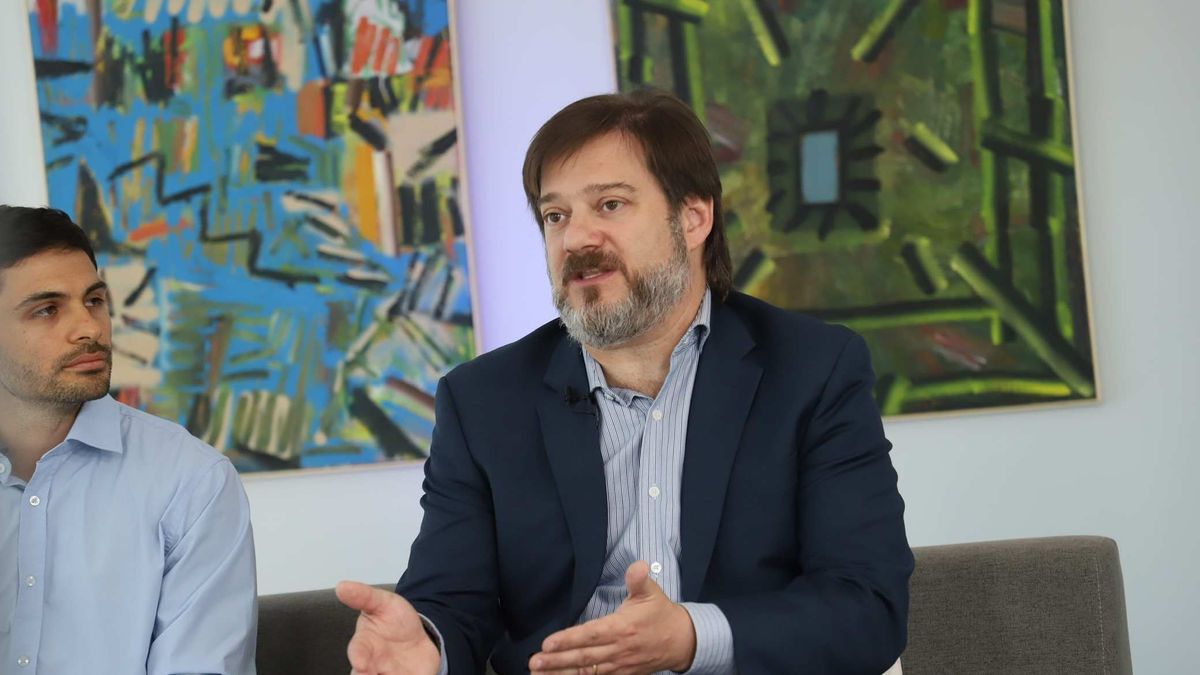At the beginning of the event, moderated by the director of Ámbito, Julian Guarino, Fernández highlighted the origin of the firm, linked to the grain market. “Matba and Rofex were two markets that were founded 120 years ago to trade wheat, corn and flax, But globally there was an enormous transformation in the last 20 years and the markets became electronic and opened to reach the end user,” he noted.
In that line he indicated: “Today it operates soybean, corn, dollar, stock, fixed income, Bitcoin, gold and oil futures. Additionally, it has two-thirds of all its people dedicated to technology because the markets “We have transformed from an exchange with an enclosure where people wearing hats and ties went to operate shouting, to technology platforms that reach clients’ cell phones and offices.”
Capital market opportunities
Fernández admitted that “There is a myth that Argentina has a very small capital market and the reality is that it is very small in terms of stock, because the Argentine saves little, the banks have few deposits and you do not have more pension funds like in other countries of Latin America and there is a lack of long-term savings.”
“When you start to see a variety of products, intermediaries and technological offerings, I think that Argentina is very good. With a more orderly macro and letting the markets form asset prices, which is something that in Argentina we were losing,” he compared.
In this regard, the MatbaRofex representative assured that “the greatest added value” of the firm “is that Any Argentine on their cell phone can see how much soy is worth in cash for next year or wheat for December and it helps them make decisions about whether to plant one crop or another, or when to do it.”
The effects of the stocks and their possible opening
On the other hand, Fernández referred to the exchange rate as “one of the most distorting restrictions on the free formation of prices, because the exchange rate is like a basic price that influences all other goods in the economy.”
Specifically, regarding the effects it causes on Matba, Rofex stated: “The dollar futures that we operate, to the extent there are stocks, have lower volume and utility. An exporter or importer who uses it to cover their payments, in reality the product is of no use to them because they do not have access to the MULC.”
At the same time, Fernández pointed out that “all Argentine exports, instead of settling at the official exchange rate, can settle 20% through the bond market and that takes away volume from agricultural futures operations.” “They are distortions that come from before, they are not from this Government, which has not yet removed them,” he pointed out.
Regarding an eventual exit from the capital control measure, he said: “I think the harmful effects outweigh the benefits, by far. I understand that the Government is prudent and does not want to have an exchange rate run, but as CEO of a market that wants the freedom of price formation for the economy’s goods, I want it to be released as soon as possible.
“I understand that maybe we have to wait, but I think it can be released at the beginning of next year,” forecast.
The bet on credit and financial education
When asked about the possibilities of credit, the MatbaRofex representative pointed out that “If you take the common investment funds, they are over 30 million, the level of inclusion is tremendous.” and maintained that “this was because the peso was devaluating and rather than having it dead, people wanted some return.”
“The mutual fund industry, which is the gateway to the capital market for the general public, gives you other tools that include SME instruments, private fixed income and investments abroad, because “Argentines must be allowed to invest wherever they want and to choose to invest in Argentina, not because they are forced to,” he stated.
In turn, he stated that “in the past, banks and the capital market were thought of as two dichotomies, but The banks have lost the gymnastics of lending and surely part of the financing they provide in the first years will be very focused through capital market instruments.”
Along these lines, Fernández pointed out as “very important” the financial education and considered key “that the candidate to be educated starts young, because what you see with what happened in San Pedro (Rainbowex) last week is that people buy promises of returns that are absolutely impossible and that is very easy if one educates that nothing is so wonderful and that there cannot be such easy investments ”.
“When I was a kid you learned at the end of your university career, today you have to get to high school,” He maintained and asserted that “from the age of 13 you can educate a lot.”
MatbaRofex projects
Finally, Fernández referred to the company’s projects. “We have a technology business towards third parties. “We not only build the technology that the market uses, but we also sell technology to participants in the Argentine capital market and we have operations in other Latin American countries, very strong in Mexico,” he confided.
Next, he announced: “The next step is a merger process with another of the markets, which is Electronic Open Market (MAE) and we are calling meetings for October and November to approve a merger process.”
“This is fundamental because to the extent that you take the best available technology, not fragmenting liquidity between different markets, you become cheaper and more efficient. “We are working for a long time so that in the first months of 2025 we will already be operating as a single market, which will be called A3,” stood out.
Source: Ambito
I am Pierce Boyd, a driven and ambitious professional working in the news industry. I have been writing for 24 Hours Worlds for over five years, specializing in sports section coverage. During my tenure at the publication, I have built an impressive portfolio of articles that has earned me a reputation as an experienced journalist and content creator.




